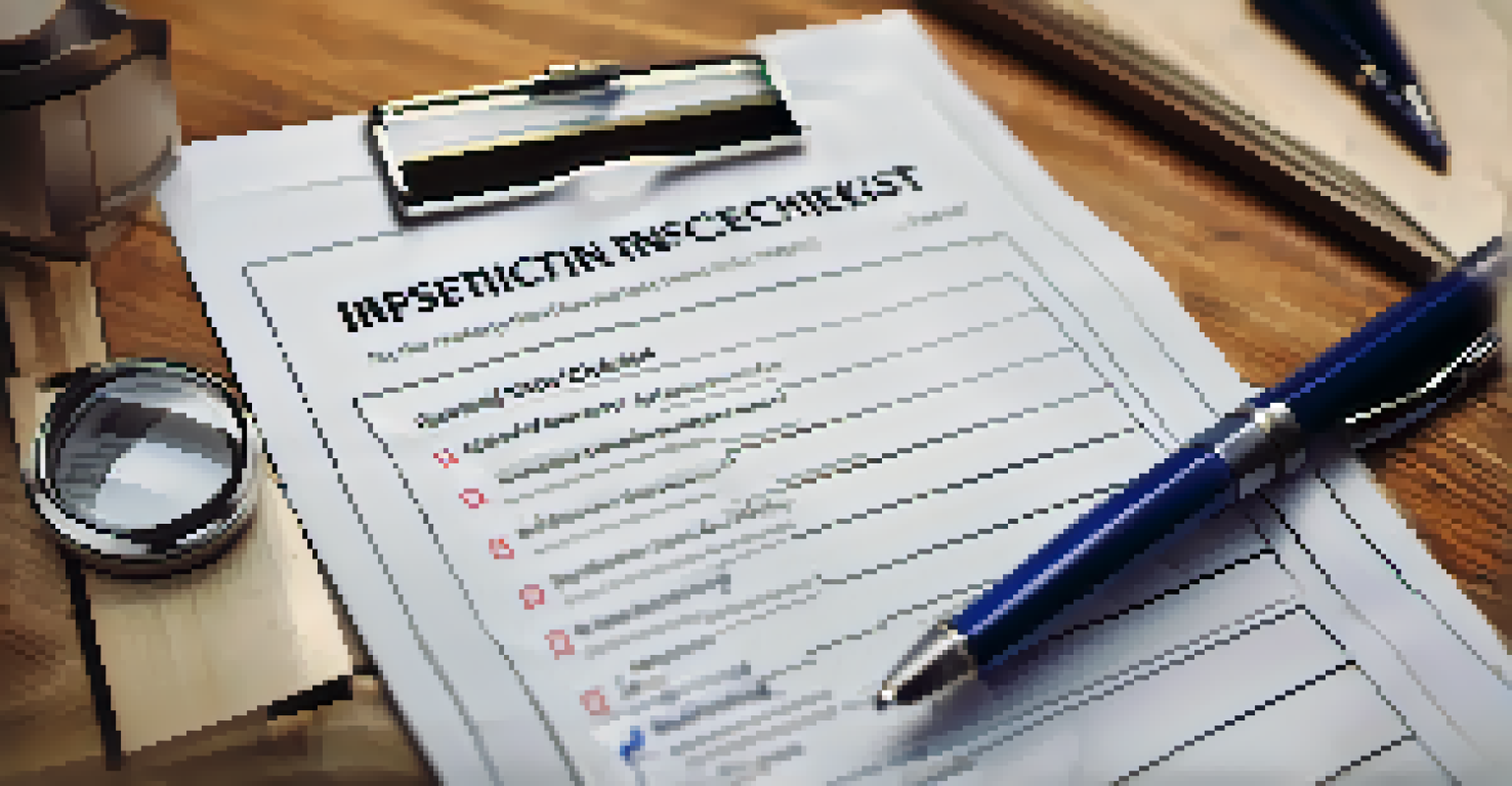Understanding Home Inspection Waivers and Risks

What Are Home Inspection Waivers?
Home inspection waivers are agreements that allow buyers to forgo a formal home inspection before closing on a property. Essentially, this means you can skip the detailed examination of the home by a professional inspector. Instead, the buyer relies on other factors, such as the property's condition or the seller's disclosures.
Buying a home without an inspection is like buying a car without a test drive. You might save time upfront, but you could end up with a lemon.
These waivers have gained popularity, especially in competitive real estate markets where buyers are eager to make strong offers. By skipping the inspection, buyers can present themselves as more appealing to sellers, potentially speeding up the closing process. However, while the appeal is clear, the implications are significant.
It's crucial to understand that waiving a home inspection doesn't eliminate the need for due diligence. Buyers should still conduct their research and consider the risks involved, balancing the desire to win a bidding war with the potential for hidden problems lurking beneath the surface.
Benefits of Waiving Home Inspections
One of the primary benefits of waiving a home inspection is that it can make your offer more attractive in a competitive market. Sellers often prefer buyers who don't request inspections, as it simplifies the process and reduces the chance of deal fallout. This can be especially beneficial in fast-paced environments where offers come in quickly.

Additionally, waiving the inspection can save time and money for buyers who are confident in the condition of the home. If you’ve already done your homework and thoroughly investigated the property, this step may seem unnecessary. In some cases, you might even gain leverage in negotiations if you feel comfortable taking this risk.
Home Inspection Waivers Explained
Home inspection waivers allow buyers to skip formal inspections, which can make their offers more appealing in competitive markets.
However, it's essential to weigh these benefits against potential long-term consequences. The allure of a smooth transaction can be tempting, but without proper checks, you could end up facing costly repairs later on.
Common Risks of Home Inspection Waivers
While waiving a home inspection can have its perks, it also comes with significant risks. The most pressing concern is that buyers might overlook critical issues, such as structural problems, pest infestations, or outdated electrical systems. These hidden defects can turn what seemed like a dream home into a nightmare shortly after purchase.
In real estate, the best deals are often the ones that come with the least surprises. Always do your due diligence.
Another risk involves the financial burden that can arise from unforeseen repairs. Without an inspection, buyers might be blindsided by the costs of necessary fixes, potentially stretching their budgets thin. This unexpected financial strain can lead to stress and dissatisfaction, overshadowing the excitement of homeownership.
Ultimately, the decision to waive a home inspection requires careful consideration. It's essential to assess your comfort level with potential unknowns and to remember that sometimes, taking a little extra time for an inspection can save you a lot of trouble down the road.
Alternatives to Home Inspection Waivers
If you’re hesitant about waiving a home inspection but still want to make your offer stand out, consider alternatives. One option is to request a limited inspection, focusing solely on critical areas of the home. This approach can provide some peace of mind without the full commitment of a comprehensive inspection.
Another alternative is to include an inspection contingency that allows you to back out of the deal if significant issues are discovered. This way, you can still present a strong offer while protecting yourself from potentially costly surprises. It’s a middle ground that can satisfy both buyers and sellers.
Weighing Risks vs. Rewards
While waiving a home inspection can speed up the buying process, it poses significant risks, such as overlooking costly repairs.
Additionally, negotiating for repairs or credits based on preliminary findings can strengthen your position. This allows you to address concerns without fully relinquishing the inspection process, ensuring you still have a handle on the home’s condition.
Understanding Seller Disclosures
Seller disclosures are vital documents that provide insight into a property’s condition and any known issues. These disclosures help buyers make informed decisions, especially if they're considering waiving a home inspection. Most states require sellers to provide this information, which can include everything from past repairs to environmental hazards.
However, it's essential to approach these disclosures with caution. While they can be helpful, they may not reveal every issue, especially those the seller may not be aware of. Additionally, some sellers might be less than forthcoming, emphasizing the importance of conducting your own research.
Understanding seller disclosures can empower buyers to make more informed decisions, even in the absence of a formal inspection. By carefully reviewing these documents, buyers can mitigate some risks associated with waiving inspections.
The Role of Real Estate Agents
Real estate agents play a crucial role in guiding buyers through the home buying process, especially when it comes to home inspection waivers. They can provide valuable advice on whether waiving an inspection is a wise choice based on the local market and the specific property. Their expertise can help buyers navigate the complexities of a competitive environment.
Moreover, agents can assist in identifying potential red flags in a property, even without a formal inspection. Through their experience, they can spot signs that may require further investigation, helping buyers avoid major pitfalls. This can be particularly beneficial for first-time homebuyers who may not know what to look for.
Alternatives to Full Waivers
Buyers can consider alternatives like limited inspections or inspection contingencies to protect themselves while still making strong offers.
Ultimately, collaborating closely with a knowledgeable agent ensures that buyers can make informed decisions, balancing the desire to compete with the need for due diligence.
Best Practices When Considering Waivers
If you're contemplating a home inspection waiver, there are several best practices to keep in mind. Start by thoroughly researching the property and its history. Look for previous inspection reports, talk to neighbors, and check online resources to gather as much information as possible before deciding to waive the inspection.
Another important practice is to consult with your real estate agent about your comfort level and the potential risks involved. They can help you weigh the pros and cons, ensuring you're making an informed decision. It’s crucial to communicate openly about your concerns and expectations.

Lastly, consider having a trusted friend or family member who is knowledgeable about home repairs accompany you on your final walkthrough. A second set of eyes can spot issues you might overlook and provide additional insight, giving you more confidence in your decision to waive the inspection.